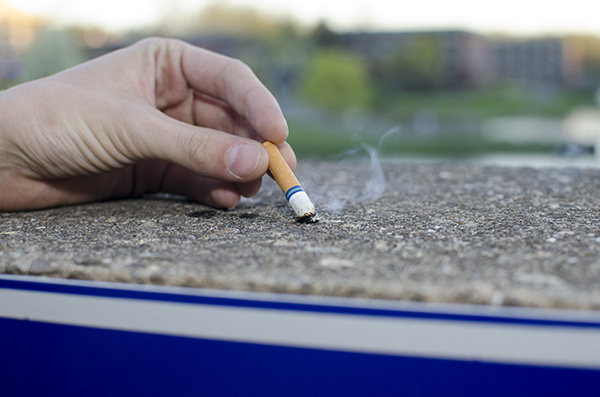
Despite a push from the SUNY Board of Trustees, SUNY New Paltz President Donald Christian thinks a potential SUNY-wide ban on tobacco products could be a drag.
Last June, the State University of New York Board of Trustees passed a resolution to support a SUNY-wide ban of tobacco on the grounds, facilities or vehicles controlled by the public school system.
The resolution, which is currently awaiting movement in the New York legislature, would make SUNY the largest public university system in the country to adopt a tobacco-free policy.
However, Christian said there has been “no guidance” from SUNY about how campuses should begin enacting the policy.
“It has gotten way out of whack,” Christian said. “Apparently there was even a committee who was watching how SUNY campuses were becoming smoke-free. I looked at the resolution more carefully, and it’s a resolution asking the legislature to approve legislation that would declare SUNY campuses smoke-free. That hasn’t happened yet, and to my knowledge the legislature hasn’t even taken it up.”
Although the resolution is currently awaiting a response from the New York legislature, some SUNY campuses, such as Buffalo State and University of Buffalo, declared themselves smoke-free earlier this year.
SUNY New Paltz’s current tobacco policy prohibits smoking in all campus buildings, SUNY-owned motor vehicles, within 50 feet of building entrances and windows, all exterior stairwells and all building roofs.
According to newpaltz.edu, the college relies on “campus community based enforcement” of the policy, stating that most violations of the policy can “be remedied through education and/or informal reminders.”
Christian said SUNY New Paltz would not follow the other campuses by declaring the college smoke free before any potential SUNY-wide ban, but instead is focusing on other ways to combat smoking.
“There are some campuses that have declared themselves smoke-free, but when you ask them how they are enforcing it, they throw their hands up in the air,” Christian said. “We have chosen to focus our efforts elsewhere instead of creating another regulation that people defy.”
In addition to enforcement and implementation complications, one concern Christian shared was for the safety of students who still choose to smoke if the ban were to be enacted.
“I have visions of a woman student up late and studying in the residence halls and she decides to have a smoke, and then needs to walk somewhere on the perimeter of campus,” Christian said. “How do we ensure people are safe in those settings?”
Danielle Kingsbury, an alumna of SUNY New Paltz, said the potential ban has good intentions, but was brought to the legislature without adequate input from SUNY students.
“Students should be at the center of every discussion involving the SUNY system and in this case they have been blindsided,” Kingsbury said. “I am aware of the push for more smoking restrictions on the [New Paltz] campus from student senators, and that is the appropriate way to deal with such issues — through elected student officials who have made their intentions known.”
In March 2012, three Student Association senators spearheaded a project to look into better ways of enforcing the already established policy at SUNY New Paltz. At the time, many students expressed interest in creating designated smoking areas on campus.
Vijay Buddiga, a fourth-year international relations major, said he thinks while the potential SUNY-wide ban has brought the issue to light, respect for smokers and non-smokers needs to be considered.
Regardless of whether the ban is enforced, he hopes the campus community will make a conscious effort to adhere to the current smoking policy.
“I really hope that even if it’s unenforced that it encourages people to clean up more and smoke on campus somewhat less frequently than now,” Buddiga said.
Kingsbury agreed, however, she said she believes the campus should also provide resources to those who are trying to quit smoking.
Student Health Services currently allows students to set up appointments to discuss the use of nicotine replacement therapy — or commonly used patches, gum, nasal spray and inhalers to curb nicotine addiction. The Student Health Services office also evaluates students for the possible 12-week dosage of bupropion, a medication used to decrease the urge to smoke, according to their website.
Christian said he believes it’s important SUNY New Paltz “beef[s] up” the efforts Student Health Services provides for cessation, as national statistics show that large numbers of young adults develop smoking habits while attending college.
Despite the unclear way in which SUNY campuses should navigate toward a tobacco-free goal, Christian said it is something he would like to implement in the future.
“I’d love to be able to do it,” Christian said. “I’d do it in a heartbeat if the enforcement and implementation issues were clear.”

